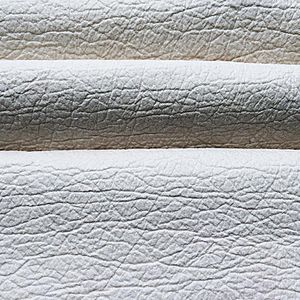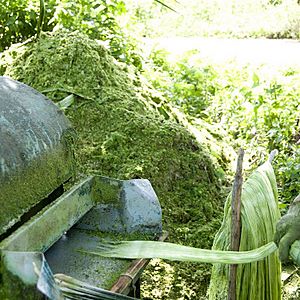Piñatex facts for kids

Piñatex fabric in white
|
|
| Type | Fabric |
|---|---|
| Material | Pineapple leaf fiber and PLA resin |
| Production method | Felting |
| Production process | Mechanized |
| Introduced | 2015 |
| Manufacturer | Ananas Anam |
Piñatex is a special material that looks and feels like leather, but it's not made from animal skin. It's a great alternative to traditional leather. This unique fabric is made from strong fibers found in pineapple leaves. It also contains a plant-based plastic called PLA and a small amount of petroleum-based resin.
A clever person named Carmen Hijosa created Piñatex. She first showed it off at a special exhibition in London. Her company, Ananas Anam Ltd., now makes and sells this innovative material.
Contents
How Piñatex Was Created
The idea for Piñatex started in the 1990s. Carmen Hijosa was working in the leather industry in the Philippines. She noticed that the leather made there wasn't very good. Also, making it was bad for the environment and sometimes dangerous for workers.
Carmen was inspired by a traditional Philippine shirt called the barong tagalog. This shirt is made from pineapple fibers. She then spent seven years working on her idea. She did a lot of research at the Royal College of Art in London. She also worked with universities and companies in Wales, Spain, and the Philippines. All this hard work helped her develop Piñatex into the material we know today.
How Piñatex Is Made
Making Piñatex involves a cool process. First, long fibers are taken from pineapple leaves. These fibers are then pressed and tangled together, like making felt. This creates a strong, flat material. A plant-based plastic called PLA is added to this material. PLA is made from things like cornstarch. This means the main part of Piñatex is 80% pineapple leaf fiber and 20% PLA. Finally, a thin layer of petroleum-based resin is added to finish the material.
This production process is very smart because it uses waste pineapple leaves. Farmers around the world produce huge amounts of waste leaves every year. These leaves are usually just left to rot or are burned. About 480 leaves, which come from 16 pineapple plants, are needed to make one square meter of Piñatex.
Farmers can earn extra money by separating the long fibers from the leaves. The leftover parts of the leaves can even be used as fertilizer for plants. Making Piñatex also saves water. It doesn't need extra water, pesticides, or fertilizers. Plus, it avoids using harmful chemicals that are often used to make traditional leather.
What Piñatex Is Like
Piñatex comes in many different colors and styles. It can have a textured surface or even a shiny, metallic look. People say it feels softer and more flexible than other fake leathers. You can also cut it, sew it, stamp designs on it, and embroider it. This makes it very useful for different design projects.
Because Piñatex is made of 80% pineapple fibers and 20% PLA, it doesn't break down easily in nature.
Is Piñatex Sustainable?
Piñatex is made from pineapple leaves, PLA, and petroleum-based resins. While PLA is made from renewable plants and is often called 'biodegradable,' it doesn't always break down easily in the environment. For example, a report from the United Nations Environmental Programme in 2015 said that plastics labeled 'biodegradable' might not greatly reduce plastic pollution in oceans. This is because they often need special conditions to break down.
Products Made with Piñatex
Piñatex has been used to make many cool products. You can find it in bags, shoes, wallets, watch bands, and even seat covers. Designers are also working on using it for clothing. Some brands like Ally Capellino, LIAN & LIV, Time IV Change, ROMBAUT, and Nae have made products with Piñatex. Big companies like Puma and Camper have even created test products using it. A vegan shoe brand called Bourgeois Boheme uses Piñatex in their sandals.
Awards and Recognition
Piñatex has received some important awards. In 2016, it won the Arts Foundation UK award for Material Innovation. In 2015, Dr. Hijosa was a finalist for the Cartier Women's Initiative Awards. Piñatex is also certified by PETA as a vegan fashion material. This means no animal products are used.
Piñatex was even mentioned in a book called Egyptian Enigma by L.J.M. Owen. It was the special fabric on a journal given to the main character, Dr. Elizabeth Pimms.
See also
 In Spanish: Piñatex para niños
In Spanish: Piñatex para niños
 | Sharif Bey |
 | Hale Woodruff |
 | Richmond Barthé |
 | Purvis Young |



